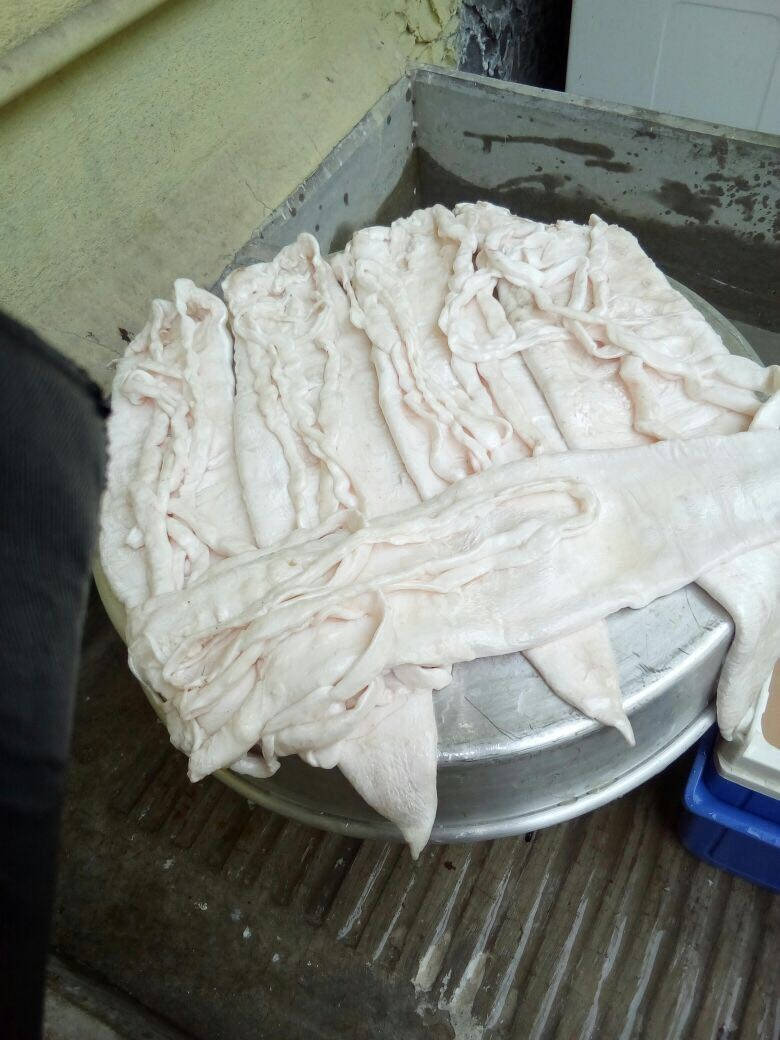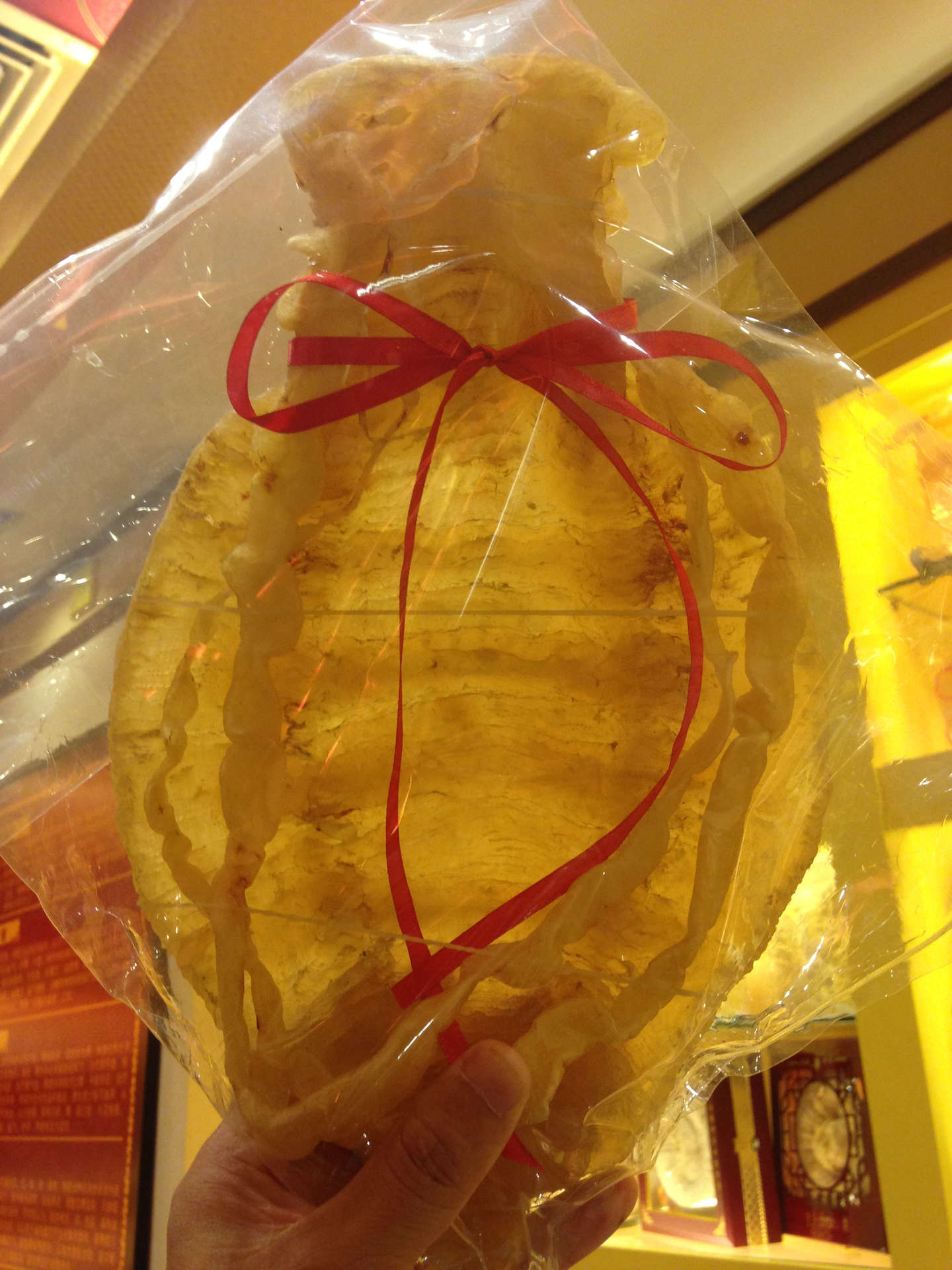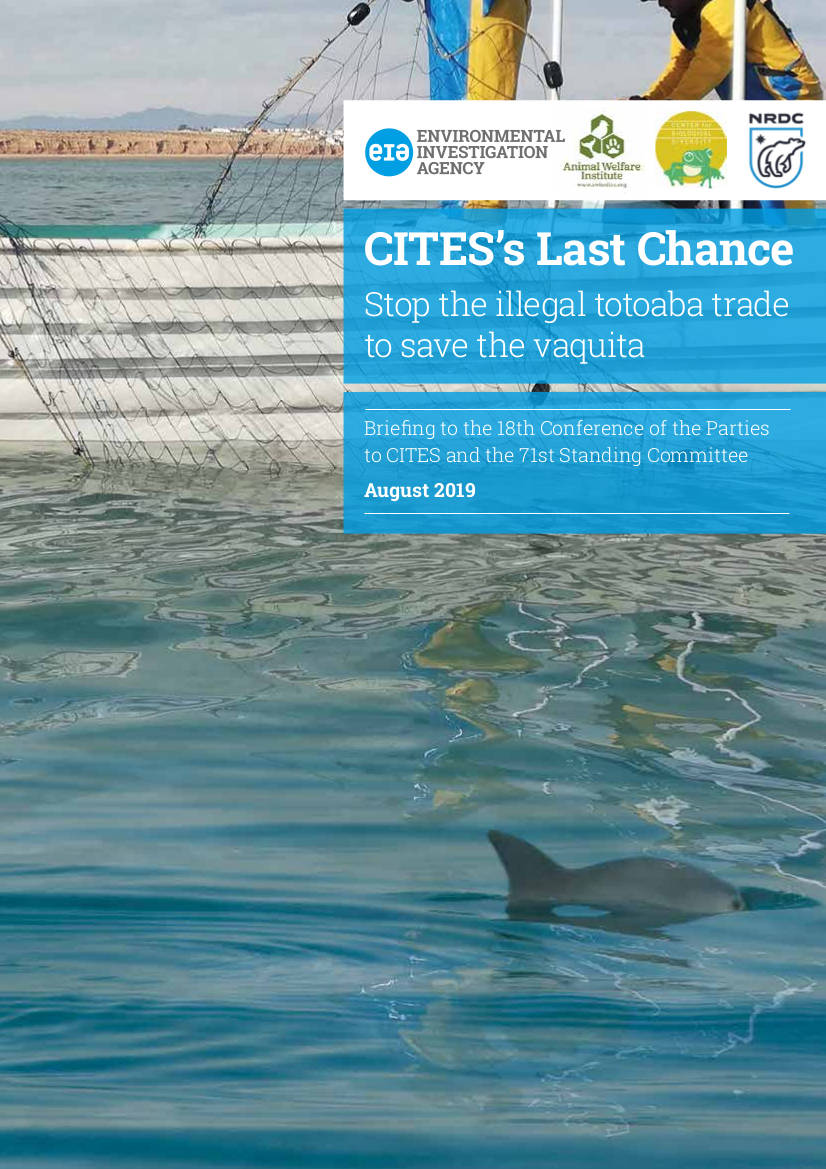Summary
At the 18th Conference of the Parties to the Convention on International Trade in Endangered Species (CITES), governments have one final opportunity to prevent the vaquita’s imminent extinction.
Only nine of these critically endangered porpoises are estimated to remain on the planet.
The small cetacean is not hunted in its own right, but is collateral damage in the pursuit of huge profits by organised criminal networks that sell totoaba swim bladders in Asian markets, primarily China.
Summary
At the 18th Conference of the Parties to the Convention on International Trade in Endangered Species (CITES), governments have one final opportunity to prevent the vaquita’s imminent extinction.
Only nine of these critically endangered porpoises are estimated to remain on the planet.
The small cetacean is not hunted in its own right, but is collateral damage in the pursuit of huge profits by organised criminal networks that sell totoaba swim bladders in Asian markets, primarily China.
The vaquita
The vaquita porpoise is the world’s smallest and most endangered cetacean. Approximately nine individuals (between six and 19) remain, down from an estimated 567 in 1999. Its distribution is restricted to an area just 24km by 12km in the northernmost Gulf of California, Mexico.
The vaquita’s tragic demise is due to unintentional capture in fishing nets, or ‘bycatch’, with illegal gillnet fishing for totoaba fish the key driver of their sudden and rapid decline.
In the short-term, the vaquita’s extinction is preventable only by eradicating illegal totoaba fishing and removing abandoned gillnets from their small remaining range. However, to date, Mexico has completely failed at this task.
A recent expert report emphasised that “there is still hope” for the species, with the remaining animals still healthy and producing calves, but only if vaquita habitat is free of gillnets.
World’s smallest cetacean
Only found in the northernmost Gulf of California
Vaquita numbers have plummeted 98.6 per cent since 2011
Numbers decimated due to illegal fishing for totoaba
The vaquita
The vaquita porpoise is the world’s smallest and most endangered cetacean. Approximately nine individuals (between six and 19) remain, down from an estimated 567 in 1999. Its distribution is restricted to an area just 24km by 12km in the northernmost Gulf of California, Mexico.
Scientists have warned for more than two decades that the survival of the vaquita depends on stopping their capture in fishing nets and drowning as ‘bycatch’. Bycatch in illegal gillnets used to catch totoaba fish was identified in 2012 as the key driver of their sudden and rapid decline.
In the short-term, the vaquita’s extinction is preventable only by eradicating illegal totoaba fishing and removing abandoned gillnets from their small remaining range. However, to date, Mexico has completely failed at this task.
A recent expert report emphasised that “there is still hope” for the species, with the remaining animals still healthy and producing calves, but only if vaquita habitat is free of gillnets.
World’s smallest cetacean
Only found in the northernmost Gulf of California
Vaquita numbers have plummeted 98.6 per cent since 2011
Numbers decimated due to illegal fishing for totoaba
Illegal fishing and trade in totoaba
The swim bladder, or “maw”, of the large totoaba fish fetches high prices on the black market in China, where it is believed by some to have medicinal properties.
Fishing and international trade in totoaba parts has been illegal for many years, but enforcement efforts have been completely ineffective, with actual reports of a recent increase in totoaba fishing.
International trade in totoaba or any part of a totoaba is illegal under CITES – the Convention on International Trade in Endangered Species.
Illegal fishing and trade in totoaba
The swim bladder, or “maw”, of the large totoaba fish fetches high prices on the black market in China, where it is believed by some to have medicinal properties.
Fishing and international trade in totoaba parts has been illegal for many years, but enforcement efforts have been completely ineffective, with actual reports of a recent increase in totoaba fishing.
International trade in totoaba or any part of a totoaba is illegal under CITES – the Convention on International Trade in Endangered Species.
The 'maw'
Dried fish swim bladder (commonly referred to as ‘maw’) is a traditional and highly valued dried seafood item in China, alongside shark fin, abalone and sea cucumber.
The highest demand occurs in mainland southern China and Hong Kong, the latter being a well-established trading centre.
Fish maw is in demand for its supposed medicinal benefits and for use as a tonic, although scientific studies supporting these properties are lacking.
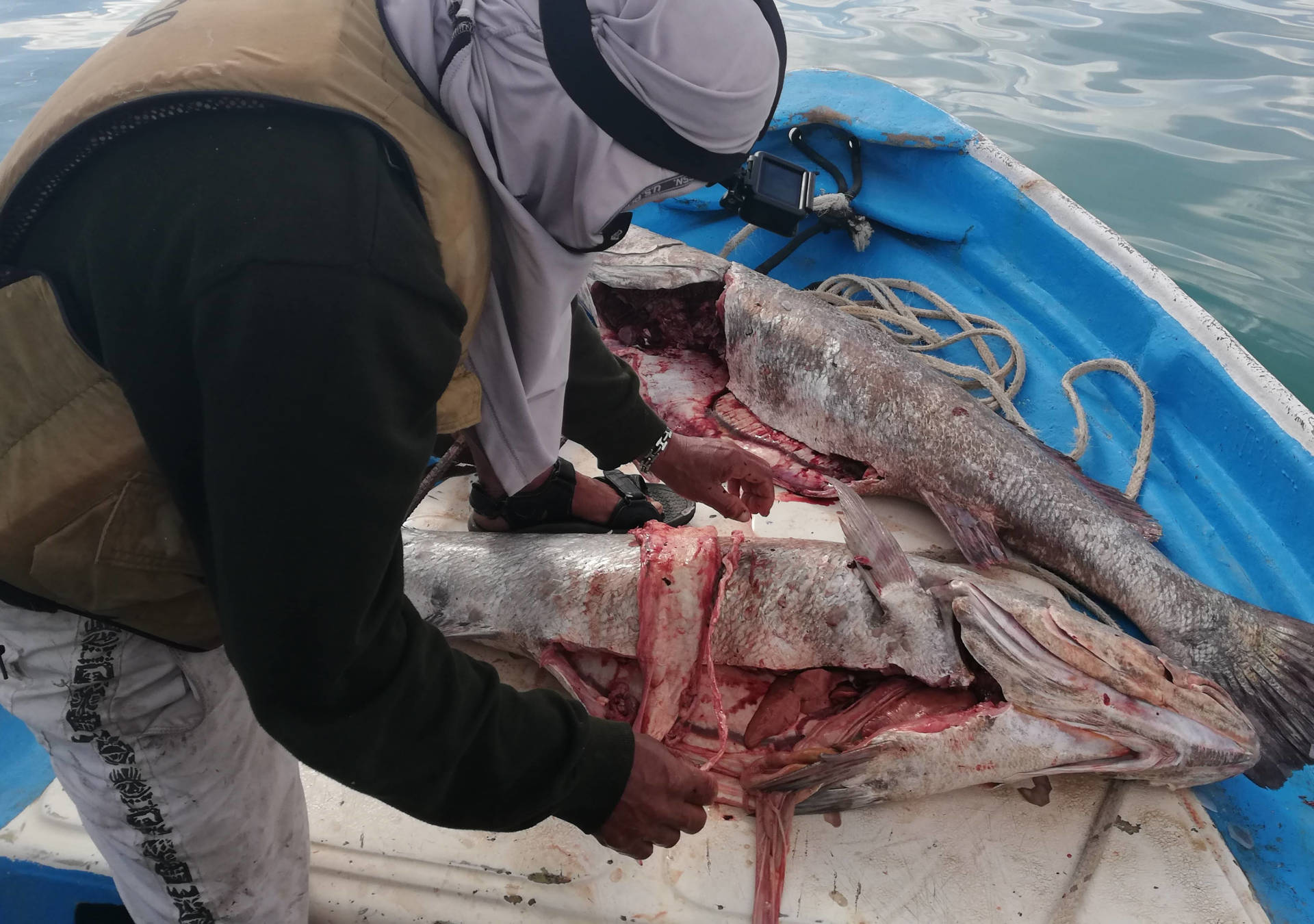
Illegally caught totoaba with its 'maw' being removed
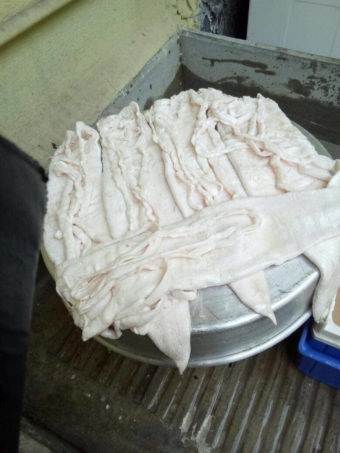
Fresh totoaba maws offered to EIA investigators in April 2018
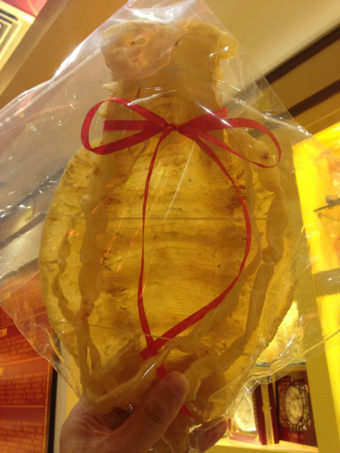
Totoaba maw for sale in Guangzhou, China, October 2018
The 'maw'
Dried fish swim bladder (commonly referred to as ‘maw’) is a traditional and highly valued dried seafood item in China, alongside shark fin, abalone and sea cucumber.
The highest demand occurs in mainland southern China and Hong Kong, the latter being a well-established trading centre.
Fish maw is in demand for its supposed medicinal benefits and for use as a tonic, although scientific studies supporting these properties are lacking.

Illegally caught totoaba with its 'maw' being removed
Fresh totoaba maws offered to EIA investigators in April 2018
Totoaba maw for sale in Guangzhou, China, October 2018
Undercover investigation
EIA has conducted a series of investigations since 2015 in southern China and Mexico revealing a persistent illicit trade in totoaba maws, with the black market supplied by criminal syndicates spanning both countries.
Cartels and corruption
Our investigations reveal that fresh totoaba maws are sourced from a cartel in Sinaloa state whose operations have been linked to kidnapping, murder and the drug trade. Corruption is commonplace and enables the illegal trade to flourish, with one instance of a trader’s friend being caught with 40kg of totoaba maw and paying a bribe of $200,000 to avoid arrest. EIA investigators were told that one criminal group was looking to expand the business by purchasing 11 fishing boats to increase supply.
Transport routes
Once the fresh maws arrive at the factory in Mexico City, they are dried and shipped overseas via air freight, often concealed amongst legitimate marine products. Chinese nationals in Mexico are recruited to transport dried totoaba maws in suitcases, usually via indirect routes including South Korea, Vietnam and Japan. A shipping agent in Hong Kong is able to move the maws into mainland China.
Seizures and confiscations
EIA continually monitors public reports of totoaba maw seizures and prosecutions by government authorities, which can be viewed on the map below.
Undercover investigation
EIA has conducted a series of investigations since 2015 in southern China and Mexico revealing a persistent illicit trade in totoaba maws, with the black market supplied by criminal syndicates spanning both countries.
Cartels and corruption
Our investigations reveal that fresh totoaba maws are sourced from a cartel in Sinaloa state whose operations have been linked to kidnapping, murder and the drug trade. Corruption is commonplace and enables the illegal trade to flourish, with one instance of a trader’s friend being caught with 40kg of totoaba maw and paying a bribe of $200,000 to avoid arrest. EIA investigators were told that one criminal group was looking to expand the business by purchasing 11 fishing boats to increase supply.
Transport routes
Once the fresh maws arrive at the factory in Mexico City, they are dried and shipped overseas via air freight, often concealed amongst legitimate marine products. Chinese nationals in Mexico are recruited to transport dried totoaba maws in suitcases, usually via indirect routes including South Korea, Vietnam and Japan. A shipping agent in Hong Kong is able to move the maws into mainland China.
Seizures and confiscations
EIA continually monitors public reports of totoaba maw seizures and prosecutions by government authorities, which can be viewed on the map below.
Enforcement efforts - Mexico
While Mexican enforcement agencies have regularly confiscated large consignments of totoaba maws, this has almost exclusively been targeted at low-level couriers. There is no evidence that the seizures have led to the dismantling of criminal networks that organise the illegal fishing and trade.
- From 1 January 2018 to 31 July 2019, more than 2,000 totoaba maws were seized in Mexico according to online reports. In addition, more than 100kg of maws were seized where the number of individual maws was not specified.
- During a peak three-week period between April-May 2018, 940 individual maws and more than 40kg of totoaba maws (mostly fresh maws) were seized.
- The major hotspot for seizures has been the International Airport of Mexico City, where nine cases were reported and over a thousand totoaba maws confiscated.
Enforcement efforts - United States
There has been just one recently reported totoaba seizure in the US. The case is ongoing.
Two Chinese nationals, Yikang Liang and Haoyu Huang, who claimed to work as chefs in a Tijuana restaurant, were transporting three boxes containing the swim bladders of 132 totoaba, valued at between $940,000 and $3.76 million.
Enforcement efforts - China
In contrast to Mexico, there are signs that enforcement efforts in China have been stepped up, leading to the dismantling of some of the crime syndicates involved.
Tackling the illegal import of totoaba maws has become a priority for the China Customs Anti-Smuggling Bureau and, as a result, China has made a series of seizures and arrests since 2018.
- In December 2018 China Customs announced that a special operation had resulted in the arrest of 16 suspects and the seizure of 444kg of totoaba maws, valued at RMB182 million ($26 million).
- In December 2018 Shanghai judicial authorities announced the first Chinese conviction for totoaba trafficking, with two defendant sentenced to jail terms of eight and seven years and fined RMB200,000 and RMB100,000 ($28,500 and $14,250) respectively.
- In March 2019 Jiangmen judicial authorities announced the prosecution of 11 suspects implicated in trafficking totoaba maws on a vast scale. The ringleader was responsible for trafficking 20,000 maws over a three-year period.
Enforcement efforts - Mexico
While Mexican enforcement agencies have regularly confiscated large consignments of totoaba maws, this has almost exclusively been targeted at low-level couriers. There is no evidence that the seizures have led to the dismantling of criminal networks that organise the illegal fishing and trade.
- From 1 January 2018 to 31 July 2019, more than 2,000 totoaba maws were seized in Mexico according to online reports. In addition, more than 100kg of maws were seized where the number of individual maws was not specified.
- During a peak three-week period between April-May 2018, 940 individual maws and more than 40kg of totoaba maws (mostly fresh maws) were seized.
- The major hotspot for seizures has been the International Airport of Mexico City, where nine cases were reported and over a thousand totoaba maws confiscated.
Enforcement efforts - United States
There has been just one recently reported totoaba seizure in the US. The case is ongoing.
Two Chinese nationals, Yikang Liang and Haoyu Huang, who claimed to work as chefs in a Tijuana restaurant, were transporting three boxes containing the swim bladders of 132 totoaba, valued at between $940,000 and $3.76 million.
Enforcement efforts - China
IIn contrast to Mexico, there are signs that enforcement efforts in China have been stepped up, leading to the dismantling of some of the crime syndicates involved.
Tackling the illegal import of totoaba maws has become a priority for the China Customs Anti-Smuggling Bureau and, as a result, China has made a series of seizures and arrests since 2018.
- In December 2018 China Customs announced that a special operation had resulted in the arrest of 16 suspects and the seizure of 444kg of totoaba maws, valued at RMB182 million ($26 million).
- In December 2018 Shanghai judicial authorities announced the first Chinese conviction for totoaba trafficking, with two defendant sentenced to jail terms of eight and seven years and fined RMB200,000 and RMB100,000 ($28,500 and $14,250) respectively.
- In March 2019 Jiangmen judicial authorities announced the prosecution of 11 suspects implicated in trafficking totoaba maws on a vast scale. The ringleader was responsible for trafficking 20,000 maws over a three-year period.
Captive breeding of totoaba - Creating a market in an endangered species?
In May 2018, the Mexican Government applied to register Earth Ocean Farms as a captive breeding operation for totoaba. According to the CITES treaty, if the facility is registered, Mexico would be allowed to commercially export totoaba parts upon issuance of a valid export permit.
An information document submitted by Mexico to CITES Standing Committee makes clear the intention is to develop the totoaba maw export market, claiming it will benefit vaquita and totoaba conservation, as well as economic development, by reducing totoaba poaching.
A legal trade in farmed totoaba would irrefutably complicate the enforcement challenge faced in addressing the trafficking of totoaba.
Authorising a legal international market for totoaba bladders opens new supply lines for the product, while simultaneously destigmatising and legitimising totoaba bladder consumption.
Given the critical status of the vaquita, the proposal should be rejected outright.
Captive breeding of totoaba - Creating a market in an endangered species?
In May 2018, the Mexican Government applied to register Earth Ocean Farms as a captive breeding operation for totoaba. According to the CITES treaty, if the facility is registered, Mexico would be allowed to commercially export totoaba parts upon issuance of a valid export permit.
An information document submitted by Mexico to CITES Standing Committee makes clear the intention is to develop the totoaba maw export market, claiming it will benefit vaquita and totoaba conservation, as well as economic development, by reducing totoaba poaching.
A legal trade in farmed totoaba would irrefutably complicate the enforcement challenge faced in addressing the trafficking of totoaba.
Authorising a legal international market for totoaba bladders opens new supply lines for the product, while simultaneously destigmatising and legitimising totoaba bladder consumption.
Given the critical status of the vaquita, the proposal should be rejected outright.
Recommendations
Animal Welfare Institute (AWI), EIA, the Natural Resource Defense Council (NRDC) and the Center for Biological Diversity (the Center) recommend that CITES SC71/CoP18 adopt trade suspensions under Article XIII against Mexico, until such time as Mexico demonstrates that it has put in place measures that will:
• ensure protection of the remaining vaquita by maintaining a net-free zone in the small area that the few remaining vaquita inhabit, with 24/7/365 surveillance by sufficiently resourced and armed personnel to respond to any attempts to set gillnets and with the authority to arrest anyone violating Mexican law;
• increase enforcement on land and in water to eliminate all setting of gillnets in the range of the vaquita and to seize all gillnets;
• ensure totoaba fishers and traffickers are prosecuted, with the application of penalties that are sufficient to deter continued criminal activities;
• fully fund and expand the net removal program and ensure the protection of net removal teams;
• strengthen existing laws to prohibit the sale, possession and manufacture of gillnets in the Upper Gulf (on land and water);
• strengthen collaboration with law enforcement authorities in totoaba demand and transit countries, including China, the United States, South Korea and Vietnam.
AWI, EIA, NRDC and the Center further recommend that SC71/CoP18
Directs the Secretariat to undertake an immediate compliance mission to Mexico, and other missions to China, the United States, South Korea and Vietnam to assess the efficacy of actions to combat the illegal totoaba trade.
Directs all Parties to:
a) support, through financial and in-kind support, all efforts to promote the conservation of wild populations of totoaba and vaquita;
b) eliminate supply and demand for totoaba and strengthen transnational law enforcement efforts to prevent and address the illegal totoaba trade;
c) communicate to the Secretariat the specific activities undertaken under this Decision in time for the information to be reviewed by the Standing Committee at its 73rd and 74th meetings.
AWI, EIA, NRDC and the Center also urge SC71
to reject Mexico’s application to register Earth Ocean Farms as a captive breeding operation for totoaba.
Recommendations
Animal Welfare Institute (AWI), EIA, the Natural Resource Defense Council (NRDC) and the Center for Biological Diversity (the Center) recommend that CITES SC71/CoP18 adopt trade suspensions under Article XIII against Mexico, until such time as Mexico demonstrates that it has put in place measures that will:
• ensure protection of the remaining vaquita by maintaining a net-free zone in the small area that the few remaining vaquita inhabit, with 24/7/365 surveillance by sufficiently resourced and armed personnel to respond to any attempts to set gillnets and with the authority to arrest anyone violating Mexican law;
• increase enforcement on land and in water to eliminate all setting of gillnets in the range of the vaquita and to seize all gillnets;
• ensure totoaba fishers and traffickers are prosecuted, with the application of penalties that are sufficient to deter continued criminal activities;
• fully fund and expand the net removal program and ensure the protection of net removal teams;
• strengthen existing laws to prohibit the sale, possession and manufacture of gillnets in the Upper Gulf (on land and water);
• strengthen collaboration with law enforcement authorities in totoaba demand and transit countries, including China, the United States, South Korea and Vietnam.
AWI, EIA, NRDC and the Center further recommend that SC71/CoP18
Directs the Secretariat to undertake an immediate compliance mission to Mexico, and other missions to China, the United States, South Korea and Vietnam to assess the efficacy of actions to combat the illegal totoaba trade.
Directs all Parties to:
a) support, through financial and in-kind support, all efforts to promote the conservation of wild populations of totoaba and vaquita;
b) eliminate supply and demand for totoaba and strengthen transnational law enforcement efforts to prevent and address the illegal totoaba trade;
c) communicate to the Secretariat the specific activities undertaken under this Decision in time for the information to be reviewed by the Standing Committee at its 73rd and 74th meetings.
AWI, EIA, NRDC and the Center also urge SC71
to reject Mexico’s application to register Earth Ocean Farms as a captive breeding operation for totoaba.
CITES’s Last Chance
Download the full report, detailing the results of our investigations. This includes references and picture credits.
CITES’s Last Chance
Download the full report, detailing the results of our investigations. This includes references and picture credits.

